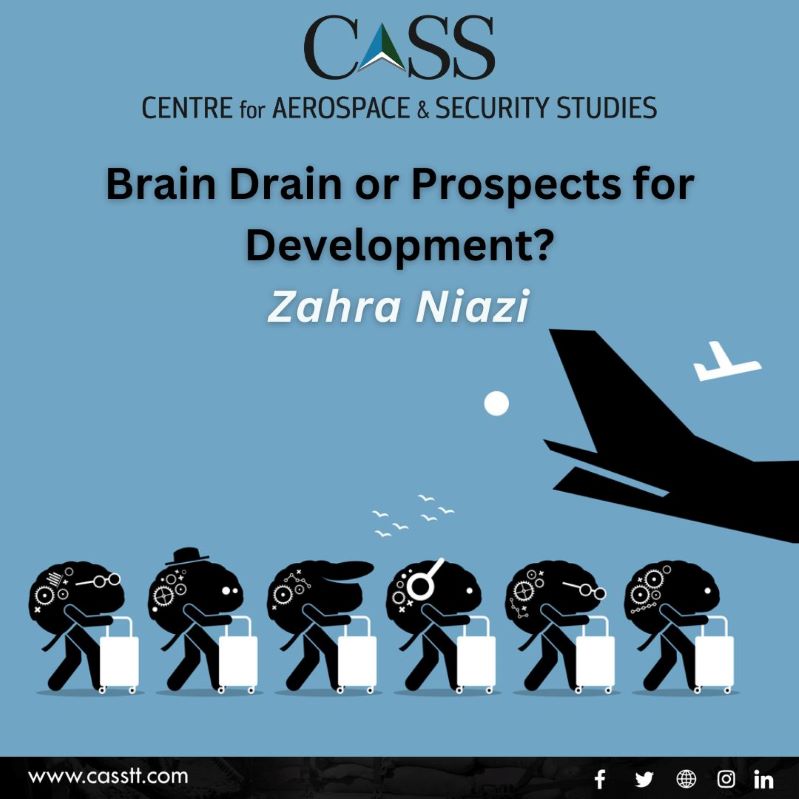Long queues of would-be emigrants continue to form outside the passport offices in Pakistan as an increasing number of Pakistanis are seeking to go abroad in pursuit of a brighter tomorrow. Official records suggest that more than 0.8 million people migrated out of Pakistan in 2022 for better economic prospects. This reflects a dismal state of affairs in the country, as migration is not an easy choice. Leaving one’s family and native land is a decision that comes with enormous personal cost for many and can only be justified if the reward appears greater than the cost.
Notably, among the recent migrants, 90,000 were professionals, such as doctors, accountants, Information Technology experts, and engineers. These numbers could well be similar or even higher in 2023 as political instability and economic uncertainty persist in the country. This raises an age-old question – what impact will this external migration of highly qualified (HQ) people have on Pakistan’s development, especially since previous data also indicates that this outflow of manpower has been increasing over the recent past.
Conventional wisdom provides two divergent views. Employing the first lens, departure of HQ citizens would deprive Pakistan of human capital that could contribute to technological development and national productivity growth. It would also lay waste the substantial proportion of public investment devoted to imparting education and skills to them. Additionally, the government would lose tax revenues as well as both quantity and quality of services needed to guarantee the population’s basic needs in education and health.
The alternative viewpoint would suggest that HQ emigrants could help boost domestic development through higher remittances, transfer of technology and scientific knowledge, and utilising the additional skills acquired from abroad if they were to return to the country. They could also bring in investment in education and facilitate the establishment of business and economic connections between their host countries and Pakistan.
However, most studies indicate that return migration, remittances, or other ways highly-skilled migrants contribute to their home country’s economy cannot compensate for the losses generated by their migration abroad. Research suggests that remittances decline with an increase in migrants’ level of education. This could be because educated migrants tend to come from wealthier families, spend a long time abroad, and are likely to bring families along or re-unite with them in the host country. As for scientific research, the majority of HQ migrants from developing countries engage in areas that are aligned with the market needs of the developed countries rather than ones that could benefit all at the international level. Data on return migration is generally limited, but some evidence has suggested that the incidence of highly skilled migrants’ return is low.
It is, thus, imperative that Pakistan take decisive action to prevent the external migration of professionals and reverse the effects of the talent outflow that has already occurred. A synthesis report by the International Labour Organization categorises possible policy responses into six categories: restriction of international mobility to foreign workers and own nationals; recruitment of international migrants; repatriation for the loss of human capital (compensation); resourcing expatriates, return of migrants to their homeland; and retention through economic development and education sector policies.
It is unjust to argue in favour of restricting international mobility as this would violate a fundamental human right, i.e., the right to leave one’s country. Recruitment of international migrants is easier said than done, especially for countries like Pakistan, which frequently suffer from an unfavourable security, economic, and political climate. It is also questionable if international migrants can be the perfect substitutes for nationals in terms of their dedication and enthusiasm to serve the country. Repatriation for the loss of human capital is unjustified as many migrants may have wanted to live in Pakistan but did not have their wants or needs fulfilled in the country and had to take the hard step of leaving their native land. On the other hand, resourcing expatriates, i.e., benefitting from them through transfer of financial remittances or knowledge, etc., is an option that should always remain open, and the state and private sector must continue to invest in policies that facilitate migrants in contributing to Pakistan’s development. However, as research suggests, it may not fully compensate for the losses generated by the outflow of HQ professionals. The sustainability of such a policy is also a matter of debate. For example, resourcing expatriates may become extremely challenging if more and more migrant families become integrated into their host societies.
The best policy option then is retention and return, i.e., creating an environment that motivates people to remain in or return to the home country, which the government is also ethically obligated to support. Unless prompt action is taken, Pakistan will continue to witness an exodus of its talented workforce, on whom it has made significant investments and whose loss it cannot afford.
Zahra Niazi is a Research Assistant at the Centre for Aerospace & Security Studies (CASS), Islamabad, Pakistan. She can be reached at [email protected].





